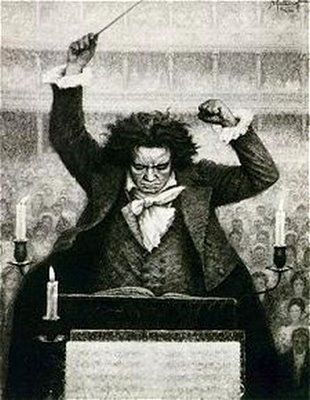London will see deaf-signed Missa Solemnis
mainIn a striking act of inclusivity, the Bach Choir have hired Paul Whittaker to offer simultaneous sign-language for tonight’s performance of Beethoven’s Missa Solemnis.
He says: ‘It’s the first time this piece has ever been signed, as far as we know… It’s hard work, translating from Latin into sign language then matching that with the music is a huge challenge but I love it…. Myself and Sir Richard Stilgoe are introducing the piece, chatting a bit about Beethoven’s own deafness and how deaf people enjoy and make music.’
Read on here.






Would it not be be easier to us Surtitles?
You would think so but the opera in London have done signed performances for absolute years. Excuse my ignorance but I genuinely want to know … if you can’t hear the music …
…if you can’t hear the music…
Not all deaf people are profoundly deaf; they have varying degrees of hearing impairment, and many are still able to hear sounds.
The profoundly deaf are said to still enjoy concerts — including symphony concerts — because they can feel the vibrations through the air, in the floor, in their seats. Though it’s not the same listening experience as it is for those of us with our hearing faculty intact, they still reportedly get a sense of the exhilaration and communal experience that a concert offers.
In addition, there are products such as wearable garments or portable sound boxes that amplify those vibrations so that the hearing impaired may feel them more strongly.
The BBC National Orchestra of Wales, the Detroit Symphony and the Los Angeles Philharmonic have long welcomed deaf listeners, recognizing them as an under-served community.
I’ve performed before deaf audiences. Deaf people hear the vibrations through their bottoms (on wood surfaces) and their feet. They also respond to visual aspects of the performance. They do ‘hear’. Talk to Dame Evelyn Glennie.
Yes, but it wouldn’t satisfy the demand for overt virtue signalling, would it?
Good Lord! Just bring the Catholic liturgy with you to the concert; Kyrie, Gloria, Sanctus, Credo, Benedictus and Agnus Dei!
I’m sure some Catholic members in the audience know it from Sunday School (!)
It’s not like there was a specific librettist writing Frei nach the Bible !!!
When singers can no longer sing audibly, this strikes me as a good idea.
This may be the first time Beethoven’s Missa Solemnis has been signed, but the text is no different from the text of any other setting of the Mass (Ordinary), and I find it hard to believe that no one has ever done a Mass in BSL or ASL.
Grotesk.
When you are deaf, which is bad enough, you won’t hear the work of which the text can easily be read.
This seems merely some meaningless PC culture gesture to demonstrate ‘inclusion’, but in an entirely improper context and without any meaningful effect.
What next? Cinema outings for the blind, explained aurally or with braille?
It tastes of exploiting people’s disabilites to score a political point, which is disgusting.
If you can’t hear the music, it all seems very odd to me. In good concert programmes – or even not so good – the words and the translation are 90% of the time included. And a Catholic Mass setting, even used by Anglicans, which is common to all Mass settings from plainsong to James
Macmillan surely can be read, and not then on subtitles for something any musician, religious or not, should know as a matter of course. Sign language for choral music? Such a distraction for everyone else
as they were at Covent Garden and ENO. And such a distraction for the soloists.
https://assistivetechnologyblog.com/2016/06/can-deaf-people-hear-music-answer-yes.html
It’s PC culture run amok. Probably just getting ahead of the curve and doing something before they get called out by social justice warriors. Did you know some universities have identified the phrase “you guys” as being a microaggression on the grounds that it generalizes all people as men which is offensive to women?
In my (limited) experience, it’s about much more than simply understanding the words. When I used to sometimes attend signed performances at ENO I would be struck how the signer would use her whole body to get across, not just the words but the whole rhythm, flow and character of the piece. Some years ago I attended a Mahler Chamber Orchestra event in their ‘Feel The Music’ (I think it was called) series, which brought together deaf choirs (yes, they exist – they sign, not sing) with the orchestra and it was one of the most moving concerts I have ever attended. Again, the music physically inhabited the signers and that ‘visual melody’ really communicated to the audience members, both hearing and deaf.
John, see my comment above. You’re wrong about this.
“Cinema outings for the blind” is in fact an established genre, namely films or TV adapted for radio, and they are great. How well one can visualize music with hand gestures is another matter, however. The asymmetry of the two kinds of adaptations could be profoundly philosophical.
I think this is a lovely gesture.
(Especially since many “normal” audience members apparently can’t hear the music either…)
To assume that if a person can’t hear, then they can’t get anything out of a musical performance seems patronizing to me. At the least, there is the vision of these huge forces gathered to perform the piece, and by watching you can tell whether the composer decided to use a single voice or full choir & orchestra for particular sections of the text, and a signer could indicate what words or verses are repeated. I figure if I can thrill to the rumble in the floor and vibrations in my chest during the big moments, then so can a deaf person.
For example, the ‘Gloria’ is a — pardon the repetition — glorious movement to behold as well as to hear. Certainly not the same experience as simply reading the text.
I’m severely hard of hearing, but do ok with hearing aids. I frequently go to live concerts, and when singing is involved, can barely tell what language is being used (including English), but just rely on reading the words, if I need to. I too, find this idea of signing the Missa Solemnis quite baffling. I mean, even if you can hear, how many of us understand the Latin anyway?
I’m all in favour of inclusivity, but this experiment does seem a little tokenistic to me.
At least the musicians were not required to be deaf. I suppose that’s next.